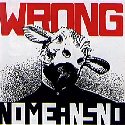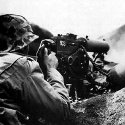|
Chade Johnson posted:You mean like when America implemented its half baked program of denazification, which resulted in thousands of innocent people without jobs because of their past voting record or even family heritage and thousands of death camp guards able to enjoy a quiet retirement with no threat of punishment? Because that happened too What? Oh, you mean like how that one time beer commercials were full of hot chicks in bikinis even though nothing you've said in the past 3 posts has to do with the topic at hand? Yeah, exactly like that.
|
|
|
|

|
| # ? Apr 27, 2024 23:01 |
|
The topic at hand is that the "American actions in Europe post WWII were more benevolent than the Soviets," which is laughable.
|
|
|
|
Someone get Admiral Snackbar back to this thread. And quick.
|
|
|
|
This is like sets of children bickering for the past two pages. I want neat new military theory. Not squabbles of 2 sentence arguments.  And if Snackbar is around, I really want to learn more regarding Japan's non-use of shields...that was kinda missed.
|
|
|
|
Chade Johnson posted:The topic at hand is that the "American actions in Europe post WWII were more benevolent than the Soviets," which is laughable. Maybe you should tell us more about East and West Germany, compare and contrast a bit.
|
|
|
|
Gimpalimpa posted:And if Snackbar is around, I really want to learn more regarding Japan's non-use of shields...that was kinda missed. You mean like why the samurai didn't use them back in feudal Japan? I believe the reason was that despite China being an important source of cultural imports over the centuries, warfare in Japan became quite "incestuous", and in some ways ritualized because the Japanese fought almost no foreign enemies, only each other in series of civil wars (Mongol invasion attempts in the 13th century and Japanese invasions of Korea in the 16th century being the two big exceptions). Shields, and weapons such as maces, battle axes and crossbows were all used in Japanese warfare at one point or another, but were marginalized in favor of the "big three" of spears/pole arms, bows and swords, all of which were best used with two hands, or so the Japanese felt at least. Heavy pavise- type shields were still used, especially in sieges but at times also on the battlefield, but generally speaking regular shields fell out of favor. Of course this doesn't explain the eagerness with which the Japanese adopted firearms when they were first brought to Japan by the Portuguese traders in the mid-16th century. The moment happened to be right for that, what with the Ashikaga shogunate proven weak after the Ōnin War, and with plenty of strong, power-greedy warlords in the country looking for means to get ahead.
|
|
|
|
Puukko naamassa posted:You mean like why the samurai didn't use them back in feudal Japan? That just doesn't completely add up, since other warfare traditions that are similar did use shields, and plenty of them. Relying on horse archery didn't stop the Mongols from bringing shields, relying on big masses of spearmen and pikemen didn't stop pretty much anyone prior to the Renaissance from bringing shields, and I can think of very few sword armed forces in history that didn't wield sword. It would instead make perfect sense for the Japanese, at least prior to the 16th century, to at least have something like a buckler. I don't buy the argument that infighting without foreign enemies prevented them from using shields. The Japanese picked up the arquebus because it was drat effective, and they were not adverse to develop more efficient methods of fighthing. That's why they changed how they drafted soldiers to develop bigger and more efficient armies based on mass infantry just as the same development happened in Europe. That's why they gradually developed new armours, experimented with lenghts of swords and spears, and developed new tactics. They were not stupid, and the whole "oh, maybe because their fighting was incestuous and they just couldn't figure out things or were to ritual about it" just doesn't make sense compared to the rest of the military development of feudal Japan. It's not like Emperor Jimmu said "oh, and those shields that everyone's raving about, just forget it, we're too insular for them, We'll do without fine, thank you". Many of the replies I've found is things like "oh well, look at these 16th century pikemen! They didn't have shields either!" or "look at these Late Medieval Knights! No shields!", "samurai were expert archers and armed with two handed swords, of course they would not have shields!", but that doesn't explain why it wasn't a good idea in 13th century Japan to hand out wooden shields to your spear armed ashigaru. I'm not talking just the samurai, but the veritable banishment of the hand-held shield from Japan for more than a millenia, something I can't find any other example of. Maybe barring Australia, the Amazon, and certain parts of central Africa, regions not known for their massed army warfare traditions. lilljonas fucked around with this message at 12:33 on Jun 28, 2010 |
|
|
|
lilljonas posted:stuff I swear I read an excellent article on the subject somewhere on the net (possibly samurai archives forums) way back when, but now I can't for the life of me find it anywhere, nor can I remember all the points it made. In any case, the relative cultural insularity of an island nation (and it's effects on the internal warfare of said nation), the lack of resources, and the general preference of mobility over protection when it came to light infantry have always seemed convincing reasons to me as to why the Japanese stopped using shields.
|
|
|
|
Good, back to military history and out of LF. Japan is far from my strong suit, but I can offer a couple suggestions. One, I don't think it was a cultural thing. Like you said, outside of a few places on Earth where the logistics never developed to field large standing armies and thus warfare of mass character never really took place, shields were almost ubiquitous in any army before shot changed the nature of warfare. Japanophiles like to point to Japan's uniqueness, such as bushido and the honor code and such, but that's really not a unique development; honor codes of the like developed independently in Europe, Africa, and the Americas, with cultural differences but a similar base relying on a shared human psyche. The only idea I can offer is that, like in Europe, warfare on Japan was essentially done on horseback. The peasants clashed on foot but the knight and noble class fought on horseback. The difference between Europe and Japan was in the stock of horses. European horses were far hardier and able to carry more weight. Presumably, the Japanese favored heavy armor more than, say, the Mongols, and between heavy armor and a shield there was just too much for the little horses to carry. Something had to give. It's the same reason lances never developed in Japan, though the lance in Europe relied on the stirrup, which itself came from Mongols and Turks. Another postulation. I may be mistaken, but isn't most of our knowledge of Japan from after the advent of firearms? The Nobunaga era Japanese used firearms more extensively (and more effectively!) than their contemporaries in Europe; Nobunaga's peasantry were firing in cascading lines in the Maurician practice decades before Maurice of Nassau introduced this in Europe. Is it possible shields could have been used before this, then disregarded when firearms became ubiquitous on the battlefield? Again, my knowledge of Japan is limited and I can't offer an even close to definitive answer. It's a very puzzling phenomenon of warfare.
|
|
|
|
HeroOfTheRevolution posted:
Japanese horses were really small, I agree on that. It definitely had an effect on the role of shock cavalry charges in Japanese warfare. But that doesn't explain why the infantry would not carry shields. Warfare was never completely mounted. If you look at mid-16th century before gunpowder made an entrance, you would look at something like 10-20% mounted troops, depending on region. So would those other 80-90% of the battlefield be prevented from using shields because Japanese horses were really small? This also makes me doubt the other big point brought up in other discussions I've read on the topic, that Japanese armour was so superior that they did not need to rely on shields, much like late medieval knights abandoned shields once platemail was good enough. Thing is, the lower ranked infantry never had much more than helmet and armour for the torso and upper thighs, maybe some metal sheets covering the arms and legs during later periods. For the lighter infantry it would make complete sense to use some kind of shield wall/hoplite formation with shields to better protect themselves. After all, Koreans used shields for exactly that purpose just a stone throw away. I don't get it. quote:Another postulation. I may be mistaken, but isn't most of our knowledge of Japan from after the advent of firearms? The Nobunaga era Japanese used firearms more extensively (and more effectively!) than their contemporaries in Europe; Nobunaga's peasantry were firing in cascading lines in the Maurician practice decades before Maurice of Nassau introduced this in Europe. Is it possible shields could have been used before this, then disregarded when firearms became ubiquitous on the battlefield? No, we have tons and tons of descriptions of pre-firearms Japan, both in contemporary scrolls and wallpapers and lots of written accounts from the period. For one thing, accounts of the battles were of great importance to back claims of defeated foes, boasts of personal successes of various generals present etc. This means that we have actually really good accounts for Japanese battles from an early age compared to many other places in the world. We do have archaelogical finds of clay figures with shields, from the Kofun period before the rise of the samurai class. You have both infantrymen and cavalrymen depicted with shields. But by 6th century these drop off and it's pretty much all shield-less from there. Puukko naamassa posted:I swear I read an excellent article on the subject somewhere on the net (possibly samurai archives forums) way back when, but now I can't for the life of me find it anywhere, nor can I remember all the points it made. I don't see how any lack of resources could be that important, as other cultures have used everything from reeds to cured hides to make shields. Isolation is the same, it didn't prevent people in Hawaii to use shields. Mobility over protection is not unheard of, but that's not an argument against things like bucklers or using shields for your troops that are meant to just stand there and hold up your enemy, like light infantry. I might sound nit-picking here, but I'm just very interested in this puzzle. Maybe it is just so simple that enough of these things were enough for the Japanese to abandon shields, but it just doesn't sound so convincing to me.  Shield from Kofun era Japan. Notice how much it looks like the type of shield that would remain popular in Korea into the 17th century. It's not strange that they are similar as much of Kofun culture came to Japan from Korea, but obviously it remained useful in Korea for a long time after it was dropped in Japan.  A Kofun era warrior, just because they look kickin' rad. They do not wear the distinctive shoulder guards yet, which would evolve to be good protection from arrows for the mounted archer samurai. But I still wouldn't mind having a shield between me and a charging enemy if I were on foot. lilljonas fucked around with this message at 17:12 on Jun 28, 2010 |
|
|
|
It might help to examine things like the length of their spears. The vast majority of their soldiers would have been using spears/pikes, swords probably only would've been really common among samurai/officers/nobles etc. From my understanding the only reason phalangists and such were able to use spear and shield like they did was because of their formation. There's no way they would have been able to use something that length one handed, without resting it on the rank in front/being covered by your neighbour's shield. I don't think the Japanese ever developed phalanxes. When it comes down to it, the guy with the longer spear wins. Add to that the fact it usually seemed to be felt that armouring and protecting your peasants wasn't worth the resources, it's better to give them a big two handed pike than a little stick and shield. If that became accepted as the norm, it seems almost reasonable to me that samurai would avoid shields as well. They're supposed to be the elite warriors, if the rabble beneath them don't hide behind shields, wouldn't it be shameful for them to carry one and not trust their superior skills? All just conjecture, but something along those lines would at least make sense. I don't really know anything about Korean history, but if they were more centralized and didn't have the same kind of constant infighting as feudal Japan, that might explain the divergence. If you have a smaller, more professional army it's possible (and becomes worthwhile) to protect and to train them in more complicated manoeuvers like a phalanx. If you're raising a horde of peasants ever other spring, it makes more sense to just stick them in a line with the biggest pointy thing you've got. l33t Lurker fucked around with this message at 18:09 on Jun 28, 2010 |
|
|
|
l33t Lurker posted:It might help to examine things like the length of their spears. The vast majority of their soldiers would have been using spears/pikes, swords probably only would've been really common among samurai/officers/nobles etc. From my understanding the only reason phalangists and such were able to use spear and shield like they did was because of their formation. There's no way they would have been able to use something that length one handed, without resting it on the rank in front/being covered by your neighbour's shield. I don't think the Japanese ever developed phalanxes. No, most spear armed infantry have used shields, not just phalanxes. That's why I'm so amazed by this. The Japanese started to experiment with longer spears, reaching lenghts comparative to Western pikes, but not until the latter half of the 16th century. Most Spears were about the length of the soldier, about 1.6 meters (they were really short back then). Later on, they would use pikes as long as 5.6 meters. It does make sense not to carry shields when you hold a 5.6 pike: after all, Renaissance pikemen had abandoned the shields by then. But it's not impossible: the Macedonian sarissa was even longer, and they used shields while wielding them. But regardless, wielding a 1.6m spear and a shield at the same time is far from unusual, and was done by everyone from Celts to Vikings to Romans to Zulus to Chinese. It is not something unique to the phalanx. And ironically enough, the Japanese foot infantry were often used in dense formations where using phalangite tactics would have worked. Again, the point of long spears is a good argument for them not to use spears in late 16th century, when others didn't use them either, but not why they didn't use them in the 12th century. And peasants did get "little sticks", sometimes even just bamboo poles, so it would make plenty of sense to make them just that more resilent by giving them some simple shields as well. Shields are relatively cheap and easy to mass produce compared to armour as well as improvise, which is one of the reason why everyone use them. And again, explaining why the elite samurai didn't use them doesn't explain why everyone else, sometimes making up the entire army in the field, didn't. quote:All just conjecture, but something along those lines would at least make sense. I don't really know anything about Korean history, but if they were more centralized and didn't have the same kind of constant infighting as feudal Japan, that might explain the divergence. If you have a smaller, more professional army it's possible (and becomes worthwhile) to protect and to train them in more complicated manoeuvers like a phalanx. If you're raising a horde of peasants ever other spring, it makes more sense to just stick them in a line with the biggest pointy thing you've got. Japanese warfare turned did turn into a semi-professional standing army model in the latter half of the 16th century, when the increasing size of armies started to really gently caress up the harvests if you just drafted peasant levies every time you went campaigning. But drafted peasant levies with shields were not unusual in many other areas, China to mention one very close example. lilljonas fucked around with this message at 18:42 on Jun 28, 2010 |
|
|
|
A thought of mine about the Japanese, is why did the officers run around with swords during ww2? I realise they never went through ww1 when the Germans were encouraged to shoot the British with the thin legs or waving a pistol around. But surely they understood that making the guy in charge identifiable from a distance was not the best idea? Or maybe its a myth I have culturally absorbed and Japanese officers did not go into battle waving around swords.
|
|
|
|
The "Shoot the guy with the fancy hat" strategy has been around for a long long time. The benefits for unit cohesion and efficiency in battle through having easily identifiable leaders outweigh the risk of being a high-value battlefield target. Also, encouraging your soldiers to shoot at the officers is different from them actually being able to find and hit a specific individual during the chaos of a fire fight. Except for the danger of snipers, officers were relatively safe from being shot up. INTJ Mastermind fucked around with this message at 23:53 on Jun 28, 2010 |
|
|
|
asbo subject posted:A thought of mine about the Japanese, is why did the officers run around with swords during ww2? That the Japanese didn't go through the trench warfare of WW1 is a good explanation for a lot of the stuff they did in WW2. Ultimately the Japanese army just wasn't a modern mechanized army the way the Americans/Russians were. Having everyone fix bayonets and run at the enemy actually works against badly trained and disciplined Chinese troops. When they tried that against the American Marines or the 5th Guards Tank Army, they all died, just like the Somme. Throatwarbler fucked around with this message at 00:33 on Jun 29, 2010 |
|
|
Throatwarbler posted:That the Japanese didn't go through the trench warfare of WW1 is a good explanation for a lot of the stuff they did in WW2. Ultimately the Japanese army just wasn't a modern mechanized army the way the Americans/Russians were. Having everyone fix bayonets and run at the enemy actually works against badly trained and disciplined Chinese troops. When they tried that against the American Marines or the 5th Guards Tank Army, they all died, just like the Somme.
|
|
|
|
|
Juno Commando posted:Yeah, but the Japanese fought at Tsingtao, against the Germans. And they were in the bloody trench warfare of the Russo-Japanese War. Western observers also saw the results of the Russo Japanese war, as well as the Franco Prussian war, and what did they do in WW1? In fact, both the Germans and the British considered the Russo-Japanese war as an example of how to fight a modern war. It takes more than a few relatively minor skirmishes to really drive the point home. The bottom line is that even when faced against relatively well led and disciplined Chinese nationalist troops, i.e. the Chinese "German" divisions that were trained and equipped by the Wehrmacht in the 1930s, the Japanese army did badly. Japan was primarily a naval power and on land, they were no where nearly as formidable as even a second rate European power. When the Japanese fought against a pre-Barbarossa Red Army at Khalkin Gol, they were completely beaten. When the Japanese sent experienced, battle hardened troops against completely green American Marines at the first battle of Guadacanal, even with Japanese air and naval superiority, they just fixed bayonets and ran at the Americans screaming, and were massacred almost literally to the last man. What they found was that even an inexperienced American was likely to be an excellent marksman, especially since many Marines were recruited from the rural South. Bonus picture of Chiang Wei Guo, Chiang Kai Shek's half-Japanese adopted son, as a young Wehrmacht officer. He was a panzer commander right up until just before the invasion of Poland. 
Throatwarbler fucked around with this message at 04:21 on Jun 29, 2010 |
|
|
|
Throatwarbler posted:Western observers also saw the results of the Russo Japanese war, as well as the Franco Prussian war, and what did they do in WW1? Don't forget the Balkan Wars, which occurred in Europe only a few years before the outbreak of WWI and involved several WWI combatants. The Balkan Wars followed a distinct WWI pattern, with trench warfare and the demonstration of the primacy of the defensive. It also introduced the devastating effectiveness of modern centralized artillery and the machine gun to the world, and was the first war where military aviation saw use. Regardless, besides a New York Times columnist, not a single Western observer made any remarks on the way machine guns and entrenchments would change warfare, and no one learned any lessons from the Balkans. It wasn't like the Balkan Wars were between minor powers, either. The Ottomans were once a Great Power and, had they not started the Second Balkan War, Bulgaria would have been the premier power in Eastern Europe. Western powers had all this evidence of the way a modern war would go and completely ignored it.
|
|
|
|
There was trench warfare way back in the US Civil War as well: http://en.wikipedia.org/wiki/Siege_of_Petersburg I was reading The Generalship of Ulysses S. Grant by J.F.C. Fuller(British general) and if I remember correctly that's the one he wrote where he talked about how the US Civil war was almost completely overlooked by European militaries. Might have been in a pamphlet sized thing written by him too, though.
|
|
|
|
Mustang posted:There was trench warfare way back in the US Civil War as well: http://en.wikipedia.org/wiki/Siege_of_Petersburg H.G. Wells seemed to have caught on. http://en.wikipedia.org/wiki/The_Land_Ironclads
|
|
|
|
The Crimean War was also fairly notable for its use of trenches and artillery barrages, plus the extensive uses of railroads and telegraphs. http://en.wikipedia.org/wiki/Crimean_war
|
|
|
|
Gully Foyle posted:The Crimean War was also fairly notable for its use of trenches and artillery barrages, plus the extensive uses of railroads and telegraphs. The Crimean War has always been interesting to me because of the mixture of Napoleonic and Great War era warfare. Is it just plain etnocentrism on my side that's the reason why I don't feel as interested in the Balkan wars, or is that just a general thing most feel?
|
|
|
|
lilljonas posted:The Crimean War has always been interesting to me because of the mixture of Napoleonic and Great War era warfare. Is it just plain etnocentrism on my side that's the reason why I don't feel as interested in the Balkan wars, or is that just a general thing most feel? Unless they're Balkanists, most people don't get too excited about the Balkan Wars. The seemingly minor events amongst middling powers tend to get overshadowed by World War I, even though both militarily and politically they were of great importance. I think the Balkans are relatively ignored in general, but that may be because it's my focus!
|
|
|
|
The Crimean and American Civil war weren't quite there yet compared to WW1, because they key weapon of trench warfare, the French 75mm gun, wasn't put into service until the turn of the century. This was the real killer of WW1, and killed far more people than machine guns or poison gas. Artillery of the American civil war and Crimean war were essentially unchanged from the artillery of Napoleon - a long tube on wheels. After you fire a shot, the recoil sent the gun flying back and the crew had to reposition and re-aim the gun. At most you could get off 1 or 2 shots per minute and the second shot mostly didn't land anywhere near the first shot. Mostly it didn't kill that many people and was used more for terror and bombing fixed emplacements. With a modern hydraulically stabilized gun like the 75, you put the gun down, aim it, and start feeding it rounds. The gun stayed in place and you could adjust your aim while firing and "walk" your fire onto the target (sometimes using an observer on radio), at thirty loving rounds per minute. So basically compared to the American civil war battle field, the WW1 battlefield now had 20x as much steel in the air just from the artillery. Artillery in WW1 was serious business compared to the artillery of the late 1800s. The artillery of today remains essentially unchanged from that first French gun.
|
|
|
|
HeroOfTheRevolution posted:Unless they're Balkanists, most people don't get too excited about the Balkan Wars. The seemingly minor events amongst middling powers tend to get overshadowed by World War I, even though both militarily and politically they were of great importance. I think the Balkans are relatively ignored in general, but that may be because it's my focus! It's mostly looked at as "these people have been fighting for thousands of years how is this different" when the truth is a lot more nuanced.
|
|
|
|
Throatwarbler posted:The Crimean and American Civil war weren't quite there yet compared to WW1, because they key weapon of trench warfare, the French 75mm gun, wasn't put into service until the turn of the century. This was the real killer of WW1, and killed far more people than machine guns or poison gas. Artillery of the American civil war and Crimean war were essentially unchanged from the artillery of Napoleon - a long tube on wheels. After you fire a shot, the recoil sent the gun flying back and the crew had to reposition and re-aim the gun. At most you could get off 1 or 2 shots per minute and the second shot mostly didn't land anywhere near the first shot. Mostly it didn't kill that many people and was used more for terror and bombing fixed emplacements. There were also differences in organization that developed alongside the modern guns. Before the Great War (it actually started with the Ottomans and Bulgarians in the Balkan War, but was not adopted by the Great Powers until midway through WWI), artillery was distributed and commanded at a low-level. This allowed artillery to be of tactical but not strategic significance; this was fine when the technology didn't really allow it to be, but technology advanced faster than doctrine. With centralization, you had artillery come under a divisional, corps, or even army level command, where modern rapid-firing artillery could place effective fire where it was most needed as directed by a single staff of highly trained officers. In the Napoleonic era, the artillery was an infantry support weapon. In the Great War era, artillery became the war-winning weapon, especially as the efficacy of infantry attacks lessened with the primacy of the machine gun on the defensive. However, artillery wasn't really an offensive weapon as it lacked any sort of mobility. It wasn't long before people realized it would be a good idea to combine the mobility of a man (or horse) with the raw firepower of a cannon, but again doctrine took awhile to catch up with it.
|
|
|
|
Chade Johnson posted:You mean like when America implemented its half baked program of denazification, which resulted in thousands of innocent people without jobs because of their past voting record or even family heritage and thousands of death camp guards able to enjoy a quiet retirement with no threat of punishment? Because that happened too
|
|
|
|
Revolvyerom posted:What part of "you're arguing actions on the other side of the globe from the continent I mentioned" did you miss? 
|
|
|
|
You might say that those old arguments are now history.
|
|
|
|
Oh good, you explained the joke. Now I get it.
|
|
|
|
Ok, time for a question to try and bring this thread back. If Germany transformed itself into a full war economy as soon as the war started in 1939, including conscripting women to run the factories similar to how the allies did, would it have been possible for the war to have turned out differently? In real life of course the Germans didn't declare a policy of total war until 1943, which was of course too late.
|
|
|
|
Shimrra Jamaane posted:Ok, time for a question to try and bring this thread back. Probably not. I think the only thing that would have saved them was not attacking the Soviets. Russia is just too big. They had horribly bad logistical problems that I'm not sure going to a full war economy early could have cured. It's not like their political system was structured well enough to direct that increased productivity to the right places (trucks&trains instead of gigantic tanks, guns, Luftwaffe Panzer Divisions, etc). I'm pretty firmly in the camp that Nazi Germany couldn't have won the war without ceasing to be Nazi Germany.
|
|
|
|
Shimrra Jamaane posted:Ok, time for a question to try and bring this thread back. The declaration of total war didn't really change a whole lot except decreasing the quality of life of the civilians. By the time total war was declared the majority of Germans knew they were losing the war, and the declaration was more like a "the end is near, fight to the death" type of announcement. If the Nazis had gone into full efficiency mode as soon as they came into power they definitely would have had a better chance at winning. However, Hitler was careful to keep the Germans at home relatively happy because he was so afraid of the "stab in the back" on the homefront that happened in WWI. On top of that, the Nazis took a lot of counterproductive measures in the name of their ideology. For example, their goal was to take women OUT of the workforce. They offered money and medals to women who stayed at home and had children. If I remember correctly 4 was the minimum amount to get money from the government and a bronze medal of some sort. If you had a 10th child, Hitler himself would be the godfather! They also discouraged advanced education by replacing many professors with less-qualified Nazi party members. As well, they forced students to do months of labor to show them that they were not of a higher social class than manual laborers. In most cases, it ended up making the problem worse. Still, Germany probably wouldn't have had the manpower to support their huge armies and keep factories staffed, that's why they had to force in so much labor. edit: I've just recently read about 5 books on Nazi Germany and Hitler so I can try to answer any questions about that area. I'd like for Admiral Snackbar to show up again, and it would nice to keep this thread somewhat alive. Freeze fucked around with this message at 23:43 on Jul 1, 2010 |
|
|
|
wins32767 posted:Probably not. I think the only thing that would have saved them was not attacking the Soviets. Russia is just too big. They had horribly bad logistical problems that I'm not sure going to a full war economy early could have cured. It's not like their political system was structured well enough to direct that increased productivity to the right places (trucks&trains instead of gigantic tanks, guns, Luftwaffe Panzer Divisions, etc). I'm pretty firmly in the camp that Nazi Germany couldn't have won the war without ceasing to be Nazi Germany. The Soviet Union was going to attack Germany anyways once they had built up. Actually, Hitler's attack caught them off guard as Stalin had ordered a drop in awareness levels to make it look like the Soviets weren't building up when in reality they were, and quite heavily. Stalin didn't count on the Germans being the aggressors. The problem was Hitler and his general staff in turn didn't count on the difficulty of campaigning in Russia in the winter.
|
|
|
|
HeroOfTheRevolution posted:The Soviet Union was going to attack Germany anyways once they had built up. Actually, Hitler's attack caught them off guard as Stalin had ordered a drop in awareness levels to make it look like the Soviets weren't building up when in reality they were, and quite heavily. Stalin didn't count on the Germans being the aggressors. The problem was Hitler and his general staff in turn didn't count on the difficulty of campaigning in Russia in the winter. Whether Stalin was planning a war with Germany is not at all settled. Certainly the Soviet Army would have been in no condition to fight until the mid to late 40s without a war. They were chronically short good field grade officers until ~late '43 and that's with plenty of on the job training. The issue with winter fighting was a matter of logistics in addition to poor planning. The german truck fleet fell apart as Typhoon progressed (due to mud followed by a freeze and months of poor maintenance) and when winter hit their locomotives couldn't handle the cold. Short of that, the Soviet state could have continued fighting until the Germans got to the Urals. In '42 when they drove on Stalingrad and the Caucasus, the Germans were on the very end of their logistical tether. It's as far from Berlin to Moscow as it is from Moscow to the Urals. There was no chance that the German logistical network could handle that.
|
|
|
|
The ruthlessness of the Germans occupying western Russia also caused problems with the supply chain. A lot of people from Ukraine were actually pleased that the Germans invaded at first, but then were turned into rebels by the brutality of the Germans. Train tracks were constantly under attack by rebels which just made it even more difficult for the Germans.
|
|
|
|
Shimrra Jamaane posted:If Germany transformed itself into a full war economy as soon as the war started in 1939, including conscripting women to run the factories similar to how the allies did, would it have been possible for the war to have turned out differently? I happened to read about this just yesterday, and the fact that often goes unmentioned is that a significant number of German women were in fact already employed in critical sectors like agriculture. Tooze probably has the exact figures, but in some Lšnder it was up to 60% of the female population. Essentially the Germans never actually really had problems with industrial production, rather the problem was transportation and raw material shortages combined with fuel shortages starting from 1944 on. The only scenario where going into a full war economy would have actually helped was that if the offensive on France in 1940 would have stalled, since at that point the Germans didn't have much ammunition reserves and so on. Adding to that, the problem in industrial production as it was mostly stemmed from disorganized acquisition and bad strategic planning, like Hitler's obsession with prioritizing bomber production instead of fighter production.
|
|
|
|
HeroOfTheRevolution posted:The Soviet Union was going to attack Germany anyways once they had built up. Actually, Hitler's attack caught them off guard as Stalin had ordered a drop in awareness levels to make it look like the Soviets weren't building up when in reality they were, and quite heavily. Stalin didn't count on the Germans being the aggressors. The problem was Hitler and his general staff in turn didn't count on the difficulty of campaigning in Russia in the winter. If you are referring to Suvorov's Icebreaker thesis (http://en.wikipedia.org/wiki/Icebreaker_%28Suvorov%29), this is not accepted by a vast majority of historians, notably David Glantz who refuted this in his book "Stumbling Colossus". This also fails to take into account that Hitler did not exactly hide his desire for lebensraum.
|
|
|
|
What's everyone's opinion on Richard Overy's Why the Allies Won? It seemed like a pretty comprehensive look at the question to me.
|
|
|
|

|
| # ? Apr 27, 2024 23:01 |
|
I'm a bit of a nerd when it comes to Swedish military history, especially during the Cold War. If anyone would be interested I can answer any questions you might have about the nuclear weapons programme, the sub hunts and S-363 or the treatment of Baltic refugees for example. And thanks to everyone for an interesting thread.
|
|
|























